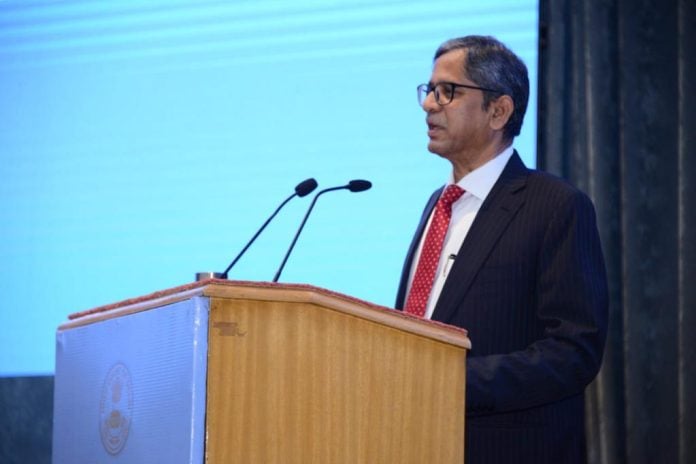Chief Justice of India (CJI) N.V. Ramana today said that during his early days in career as a lawyer, he was keen on joining politics, but destiny set him on a career path to become a judge.
The CJI talked about his journey from the Bar to the Bench, highlighting how accepting judgeship would mean one has to make many sacrifices.
Remembering his study years, CJI Ramana said he was born into an agricultural family and went to the village school, where English was introduced in class 7.
He said after completing his BSc, his father encouraged him to study law.
“I practiced at the Magistrate Court in Vijayawada. Once again, encouraged by my father, I moved to Hyderabad to practice before the Andhra Pradesh High Court,” recalled the CJI.
Ramana said he then received offer for judgeship, while practicing from Taluka Court to Supreme Court. The CJI further said that he was also appointed Additional Advocate General of Andhra Pradesh.
“I was keen on joining active politics, but destiny had planned otherwise,” he added.
As per Ramana, it was not easy to give up something, for which he had worked so hard.
Delivering the inaugural ‘Justice SB Sinha Memorial Lecture’ on the topic “Life of a Judge,” organised by the National University of Study and Research in Law, Ranchi.
Talking about the difficulties faced by judges, he said one major fallout was that a judge would have to give up his social connections built over the years.
He said the journey from bar to bench was not natural.
“Over the years, I had built career and life around the people. I knew while moving from bar to bench, one has to give up the social connections,” he said.
He also lamented how false narratives are peddled that judges lead “easy lives”.
“When false narratives are created about the supposed easy life led by judges, it is difficult to swallow,” he said.
In this regard, he explained the amount of hard work a judge has to put in.
“A person who has no connection with the profession cannot even imagine the number of hours that go into preparation. We spend many hours reading the paper-books and making notes for matters listed the next day. Preparation for the next day begins soon after the court rises, and will go on beyond midnight on most days. We continue to work even during weekends and court holidays to do research and author pending judgments. In this process, we miss out on many joys of our lives. Sometimes, we miss out on important family events,” he said.
“At times, I wonder if my grandchildren would recognise me at all after failing to see them for days together,” he added.


